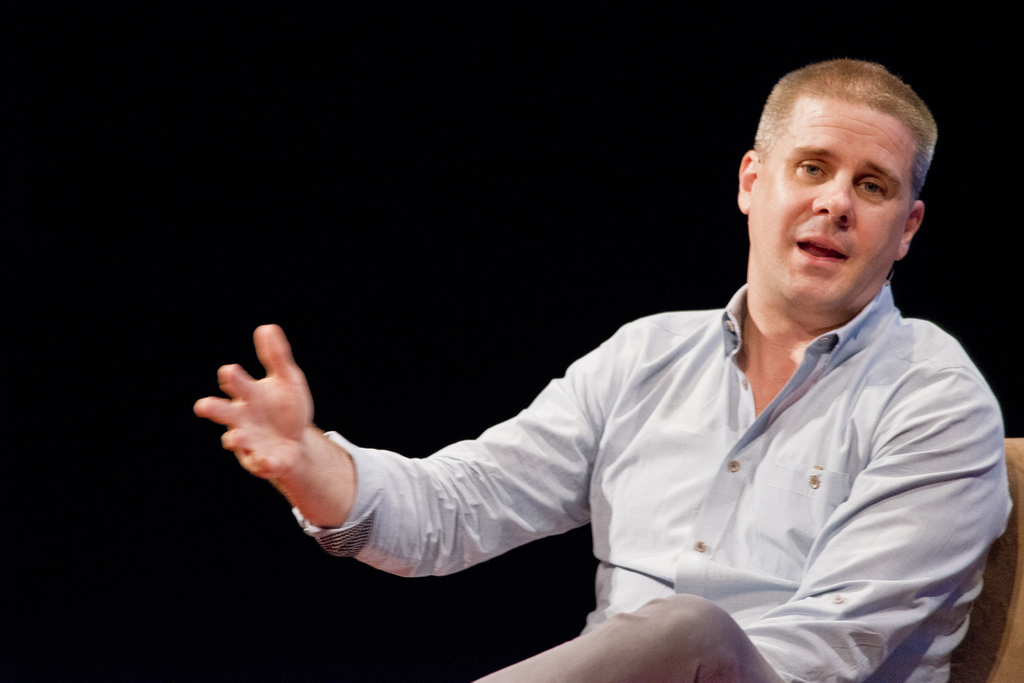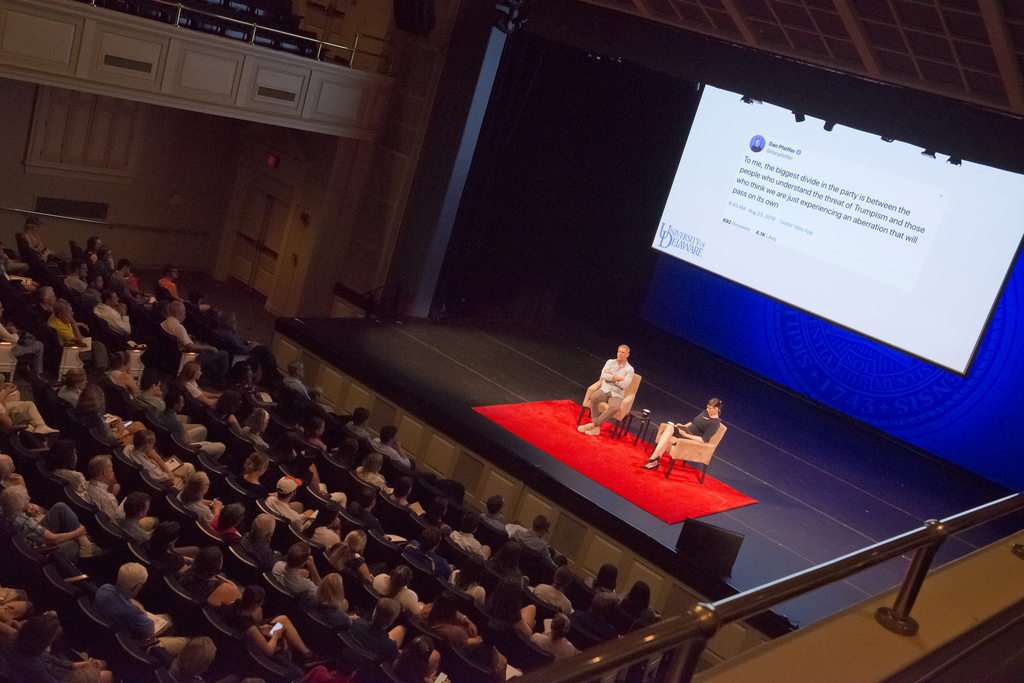National Agenda with Dan Pfeiffer : Activism comes first
Delaware native and podcast host Dan Pfeiffer discusses the role of Democrats
By Charlotte Groves, University of Delaware senior and intern for the University of Delaware’s Center for Political Communication
Watch the video. Read the transcript. Listen to and download the podcast. Read the news story in The Review.
SEPTEMBER 13, 2019″Dan Pfeiffer, a Delaware native and former Obama campaign communications director, emphasized activism over civility last week when he spoke at the University of Delaware. The co-host of the popular podcast Pod Save America and author of a #1 best seller discussed the importance of activism and his take on the upcoming election. Pfeiffer was the featured guest on September 4 for the first event of the National Agenda 2019 speaker series, moderated by National Agenda Director Lindsay Hoffman, associate professor of communication at UD.

When asked about what advice he can give in engaging in effective dialogue around politics on American college campuses, Pfeiffer said that we should start with listening. “I think that’s the big thing that we need to do is listen to people to try to understand why they think the way they do. What life experiences, what positions, have led them to feel the way they feel about whatever the issue is, whether it’s political, or something else,” said Pfeiffer. “There’s too much talking and not enough listening. This is not just a problem on college campuses. This is in America writ large in the age of Twitter and Facebook.”
Pfeiffer never thought he would get into podcasting, until sports media personality Bill Simmons contacted Pfeiffer and his colleague, filmmaker Jon Favreau, and asked if they’d be interested. Pfeiffer started Crooked Media with John Favreau, Jon Lovett, and Tommy Vietor, and became a fulltime podcaster with the intentions of using it as a platform to encourage people to get involved in politics. Pod Save America now has 1.5 to 2 million listeners per episode.
Pfeiffer said that he is more interested in activism than civility. “Our podcast is not about how do we get people to be nice to each other. It is helping people who are concerned about the direction of this country find positive productive ways to channel their anger.” Now more than ever, it is important to do the substantive work of political activism.

Pfeiffer said that the upcoming presidential election is probably the most important one we will face in our lifetimes. He noted that the polls literally mean nothing and we do not have enough information to make judgements about who can take on the task to beat Trump yet.
In a post-Obama Trump era as a Democrat, Pfeiffer said he is hopeful. In his book, Yes We (Still) Can: Politics in the Age of Obama, Twitter and Trump, Pfeiffer examines how Americans can control their own fate. He was inspired by the activism of Americans during the Trump Administration, including the Women’s March, the 2017 protest against the travel ban at the San Francisco International Airport, and March for Our Lives. “If those people turn out and become active full-time citizens, then the future of this country is very hopeful,” said Pfeiffer.
If Democrats want to win in the next presidential election, Pfeiffer suggests, “You have to be willing to run, to run to win”not to lose. Too many politicians are afraid of losing.” Candidates must also be willing to experiment. The structure of the modern campaign is still fundamentally centered around television ads, mail, and phone calls to landlines. “We have to update the model of campaigns to succeed,” said Pfeiffer, if the key for Democrats to win is turning out young people.
In a recent Tweet, Pfeiffer said, “To me, the biggest divide in the party is between the people who understand the threat of Trumpism and those who think we are just experiencing an aberration that will pass on its own.” Pfeiffer expressed concern for the state of American democracy. “The Republican Party has been part of a concerted strategy based in the knowledge that the country is getting younger and more diverse and therefore more likely Democratic. So, they have been engaged in a strategy to ensure, by, from voter suppression, gerrymandering, changing campaign finance laws, to increasing the influence of billionaires, stealing Supreme Court seats and rigging the courts. That is all part of a strategy to ensure that a conservative minority that is plutocratic in nature will govern a growing, diverse, progressive, more populist majority.”
About National Agenda
The ninth annual National Agenda speaker series, hosted by the University of Delaware’s Center for Political Communication, brings nationally known speakers to campus and encourages students, staff, faculty, and community members to join the conversation. CPC Associate Director Lindsay Hoffman directs the series. This year’s theme, “Direction Democracy,” explores where we have been, where we are going, and the current state of democracy in the United States. National Agenda is free and open to the public. It is made possible with support from the University of Delaware’s Office of the Provost and the College of Arts and Sciences. For more information, please visit cpc.udel.edu/nationalagenda.
